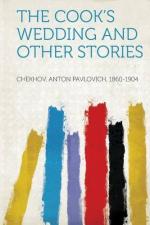“Yet maybe it is the General’s,” says the policeman, thinking aloud. “It’s not written on its face. . . . I saw one like it the other day in his yard.”
“It is the General’s, that’s certain!” says a voice in the crowd.
“H’m, help me on with my overcoat, Yeldyrin, my lad . . . the wind’s getting up. . . . I am cold. . . . You take it to the General’s, and inquire there. Say I found it and sent it. And tell them not to let it out into the street. . . . It may be a valuable dog, and if every swine goes sticking a cigar in its mouth, it will soon be ruined. A dog is a delicate animal. . . . And you put your hand down, you blockhead. It’s no use your displaying your fool of a finger. It’s your own fault. . . .”
“Here comes the General’s cook, ask him. . . Hi, Prohor! Come here, my dear man! Look at this dog. . . . Is it one of yours?”
“What an idea! We have never had one like that!”
“There’s no need to waste time asking,” says Otchumyelov. “It’s a stray dog! There’s no need to waste time talking about it. . . . Since he says it’s a stray dog, a stray dog it is. . . . It must be destroyed, that’s all about it.”
“It is not our dog,” Prohor goes on. “It belongs to the General’s brother, who arrived the other day. Our master does not care for hounds. But his honour is fond of them. . . .”
“You don’t say his Excellency’s brother is here? Vladimir Ivanitch?” inquires Otchumyelov, and his whole face beams with an ecstatic smile. “’Well, I never! And I didn’t know! Has he come on a visit?
“Yes.”
“Well, I never. . . . He couldn’t stay away from his brother. . . . And there I didn’t know! So this is his honour’s dog? Delighted to hear it. . . . Take it. It’s not a bad pup. . . . A lively creature. . . . Snapped at this fellow’s finger! Ha-ha-ha. . . . Come, why are you shivering? Rrr . . . Rrrr. . . . The rogue’s angry . . . a nice little pup.”
Prohor calls the dog, and walks away from the timber-yard with her. The crowd laughs at Hryukin.
“I’ll make you smart yet!” Otchumyelov threatens him, and wrapping himself in his greatcoat, goes on his way across the square.
THE DEPENDENTS
MIHAIL PETROVITCH ZOTOV, a decrepit and solitary old man of seventy, belonging to the artisan class, was awakened by the cold and the aching in his old limbs. It was dark in his room, but the little lamp before the ikon was no longer burning. Zotov raised the curtain and looked out of the window. The clouds that shrouded the sky were beginning to show white here and there, and the air was becoming transparent, so it must have been nearly five, not more.
Zotov cleared his throat, coughed, and shrinking from the cold, got out of bed. In accordance with years of habit, he stood for a long time before the ikon, saying his prayers. He repeated “Our Father,” “Hail Mary,” the Creed, and mentioned a long string of names. To whom those names belonged he had forgotten years ago, and he only repeated them from habit. From habit, too, he swept his room and entry, and set his fat little four-legged copper samovar. If Zotov had not had these habits he would not have known how to occupy his old age.




